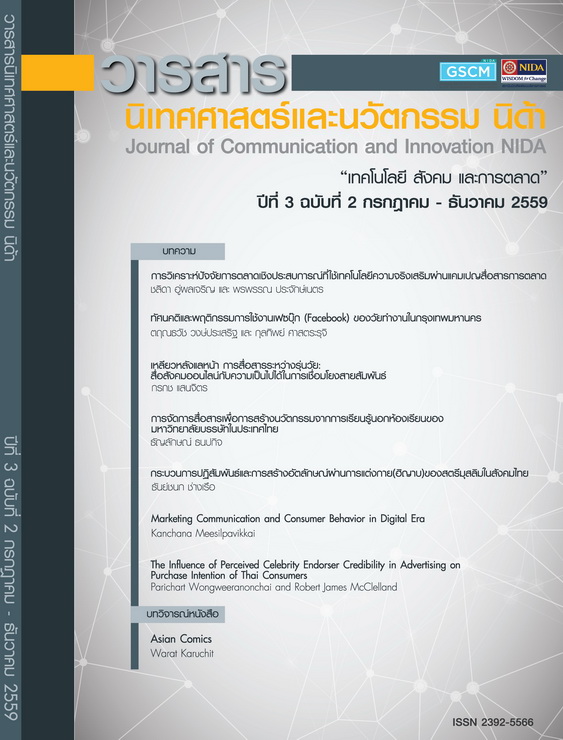The Influence of Perceived Celebrity Endorser Credibility in Advertising on Purchase Intention of Thai Consumers
Main Article Content
Abstract
ในสังคมไทยนักโฆษณามักนำผู้ที่มีชื่อเสียงมาใช้ในกลยุทธ์การสื่อสารทางการตลาดเพื่อสื่อสารเกี่ยวตัวสินค้าอยู่อย่างกว้างขวางในขณะที่งานวิจัยที่เกี่ยวข้องกับความน่าเชื่อถือของบุคคลที่มีชื่อเสียงนั้นยังคงมีจำนวนจำกัด งานวิจัยชิ้นนี้จึงมีวัตถุประสงค์ในการพัฒนาแบบจำลองการวัดความน่าเชื่อถือของบุคคลที่มีชื่อเสียง เพื่อช่วยในการคัดเลือกบุคคลที่มีชื่อเสียงมาใช้ในกลยุทธ์การสื่อสารทางการตลาดในประเทศไทย
แบบจำลองการวัดความน่าเชื่อถือของบุคคลที่มีชื่อเสียงนี้วิเคราะห์ด้วยวิธีการสร้างโมเดลสมการโครงสร้าง (Structural Equation Modeling)โดยมีกลุ่มตัวอย่าง เป็นประชาชนที่อาศัยอยู่ในกรุงเทพ จำนวน 420 คน นอกจากนี้งานวิจัยชิ้นนี้ยังเปิดโอกาสให้ผู้ตอบแบบสอบถามได้เลือกบุคคลที่มีชื่อเสียงและตัวสินค้าด้วยตนเอง เพื่อเป็นการสะท้อนการรับรู้ที่แท้จริงของผู้บริโภคชาวไทย โดยวิธีนี้จะช่วยลดช่องว่างในวิธีการวิจัยเกี่ยวความสอดคล้องกันของบุคคลที่มีชื่อเสียงและตัวสินค้า ที่เกิดขึ้นในงานวิจัยในอดีต (Till and Busler, 1998, 2000)
ผลการวิจัยพบว่า แบบจำลองการวัดความน่าเชื่อถือของบุคคลที่มีชื่อเสียงที่ได้รับการพัฒนานั้น มีความเที่ยงตรงเหมาะที่จะใช้กับกลุ่มผู้บริโภคชาวไทย อย่างไรก็ตาม มีเพียงปัจจัยด้านความดึงดูดของบุคคลทีมีชื่อเสียงและความเชี่ยวชาญของบุคคลที่มีชื่อเสียงเท่านั้น ที่มีความเกี่ยวข้องอย่างมีนัยสำคัญกับความตั้งใจที่จะซื้อสินค้า ดังนั้นแบบจำลองการวัดความน่าเชื่อถือของบุคคลที่มีชื่อเสียงที่ได้รับการปรับแล้วนี้ นำเสนอแนวทางปฏิบัติในการเลือกบุคคลที่มีชื่อเสียงที่เหมาะสมให้กับการนำเสนอสินค้าแก่นักโฆษณาและนักการตลาดเพื่อยกระดับความมีประสิทธิภาพของการโฆษณาและผลลัพธ์ที่ได้จากการรณรงค์
Thai advertisers have used the celebrity strategies widely to promote products while the number of studies on celebrity credibility is still limited. The aim of this research is to develop the comprehensive celebrity credibility measurement model for aiding celebrity selection in Thailand.
This model was tested using the structural equation modeling approach. The sample consisted of 420 Thai consumers living in Bangkok Metropolitan area. Furthermore, in order to bridge the methodological gap regarding the celebrity and product match-up in the previous studies (Till & Busler, 1998, 2000), the present research allowed the respondents to self-select the celebrity and product in order to better reflect the true perceptions of Thai consumers.
The results showed the modified celebrity credibility measurement model was validated with Thai consumers. However, onlyperceived attractiveness and perceived expertisewere significantly related to the purchase intention. The revised model, therefore, provides advertisers and marketers with practical guidelines to select an appropriate celebrity endorser in order to enhance the effectiveness of advertising and the resulting campaigns.
Article Details
ข้อความและความเห็นในวารสารนิเทศศาสตร์และนวัตกรรม นิด้า เป็นของผู้เขียนแต่ละท่าน มิใช่ของคณะนิเทศศาสตร์และนวัตกรรมการจัดการ สถาบันบัณฑิตพัฒนบริหารศาสตร์


